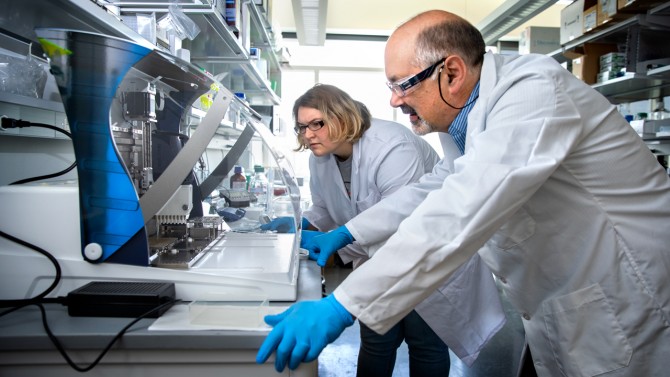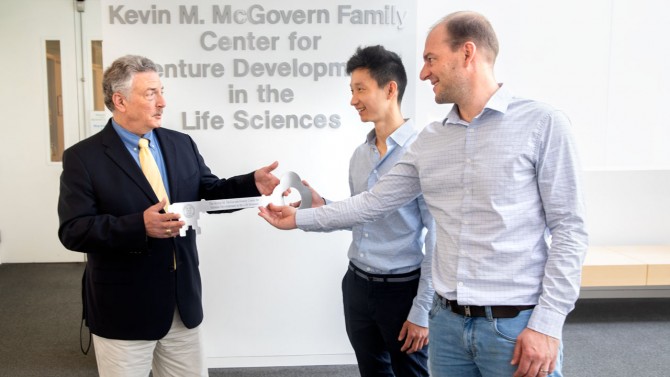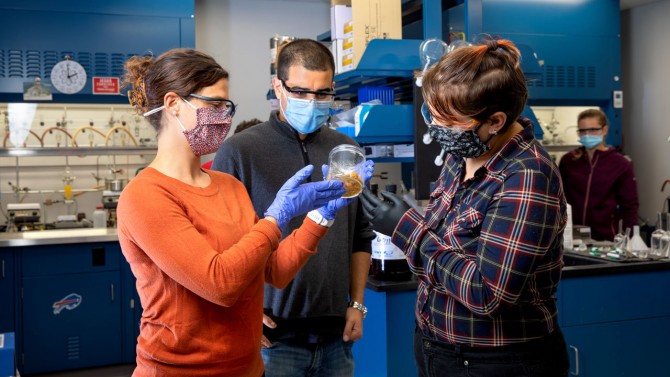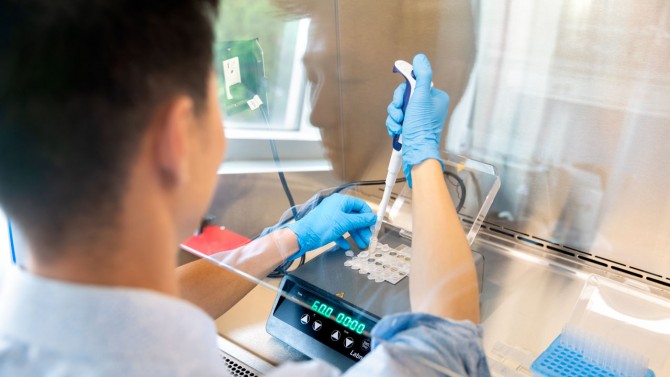When Lou Walcer ’74 stepped into the new business incubator space on Weill Hall’s fourth floor 10 years ago, he saw a blank canvas of opportunity.
The Kevin M. McGovern ’70 Family Center for Venture Development in the Life Sciences was entirely painted white, with empty laboratory benches and shelving, blank walls, new office furniture and a few conference rooms.
In time, it would become filled with fledging life sciences companies getting their start with the help of Walcer, the McGovern Center’s founding director.
“The role of the incubator is not just to provide a bunk for baby companies,” Walcer says. “The role is to propel their development by making them integral members of the Cornell community, and making Cornell’s immense resources available to them – without jeopardizing our role as a nonprofit institution.”
Since it opened in 2011, the center has helped clients earn $130 million in equity investment, $25 million in product and service revenue, and about $30 million in Small Business Innovation Research and Small Business Technology Transfer grants – highly competitive federal research programs that seek potential startups for commercialization.
The McGovern Center is celebrating its 10th anniversary and throughout the success, the one constant has been Walcer.
‘We need a go-getter’
Born in Brooklyn and raised in Lindenhurst, New York, Walcer started his Cornell student career as an engineering major, then veered toward biology, turned briefly to Spanish and landed as an English major with a bent toward medicine.
After graduation, through networking and a nudge from the Cornell employment placement office, Walcer was first hired as a copywriter with William Douglas McAdams, a prominent New York City ad agency specializing in medical and pharmaceutical advertising.
Walcer continued working in advertising while he concurrently pursued an MBA from New York University. He then switched to the “client” side, serving in a variety of positions in marketing, business development, and mergers and acquisitions with major multinational pharmaceutical companies.
Leaving New York, he turned to the Midwest. Walcer was recruited as a business officer and a consultant for a young company in Cleveland, helping other midwestern startups as well.
Ultimately Walcer served as president and general manager of a company making medical devices for drug delivery. When it was sold in 2005, the Cleveland Clinic recruited him to incubate medical startups. He had a knack for the complexities of growing young companies.
Meanwhile, in the throes of the Great Recession in 2008, the late Robert Buhrman, M.S. ’69, Ph.D. ’73, Cornell’s senior vice provost for research, knew the kind of person he wanted to direct Cornell’s newly built Weill Hall business incubator space. Its mission would be to offer premier lab space and give scientists quality business acumen.
“We need a go-getter,” Buhrman said at the time, “who can interface well with the inventors, as well as with the investors.”
Months after Buhrman initiated his search for a McGovern Center director, Lou and his wife, Roberta Bandel Walcer ’74, were driving long distance one weekend. As Roberta thumbed through Cornell Alumni Magazine, she noticed an advertisement for the McGovern Center job.
She read the position description aloud to Lou, then said, “This sounds like it’s your job at the Cleveland Clinic, only this is for Cornell.”
Lou now says with a smile: “Let’s just say I was strongly encouraged to apply.”
He got the job.
A key role
Walcer developed the philosophy that would set the McGovern Center apart from similar programs across the country.
Walcer gives each company that enters the incubator the key to the city – so to speak. He had a large key specially made and presents it during a photo opportunity when new companies join.
“I see us as the concierge,” Walcer says. “You need a special microscope? It’s over here. You need a machine shop? It’s over there. Every obscure piece of equipment that a startup needs probably exists somewhere on the Cornell campus.
“The whole idea of the key emerged out of that,” he says. “When we bring a new client into the center, it’s like ‘Welcome, you now have the key to Cornellville.’”
Walcer introduces startups to key mentors, shows them established state and national programs to fill gaps in expertise or funding, or simply offers good ideas.
Adam Boyko, associate professor of biomedical sciences in the College of Veterinary Medicine, and his brother Ryan Boyko had developed canine swab tests to find the genetic basis for dog diseases and traits. Eventually, their venture would bring about the Embark Breed + Health DNA kit.
In the case of Embark, Walcer managed to mine the College of Veterinary Medicine’s strong alumni system to answer the startup’s marketing surveys. After asking hundreds of veterinary college alumni how they would use this DNA kit in their own practices, Embark built its business model around those responses.
And when Zymtronix joined the McGovern Center in 2014, it stabilized enzymes to clean up toxic water leftover from fracking. But getting traction was tough. Walcer suggested that the company offer its enzyme stabilization to a diverse set of businesses.
Zymtronix now develops stabilized enzymes for a range of commercial uses, including pharmaceutical and agricultural applications, as well as for the food, flavor and fragrance industries – where precision enzymes are needed.
In early 2020, Zymtronix formed a strategic agreement with Tate & Lyle PLC, a large British-based food manufacturer, to help create ingredients.
Stéphane Corgié, CEO of Zymtronix, has gained an appreciation for the business world under Walcer’s watchful eye. “Business is not a straight path,” he says.
Zymtronix has leveraged McGovern resources including a handful of skilled executives-in-residence – former company presidents, financial and venture capital experts, a pharmaceutical professional – and a large team of volunteer mentors.
The executives-in-residence and the volunteer mentors, along with Walcer, provide an intangible factor, Corgié notes.
“When you start a company, and especially if it’s in technology, you need people who can reassure you,” he says. “That’s where Lou has been excellent – listening, advising and reassuring.”
Startups arrive
Gaining admittance into the McGovern Center is not easy.
When startups apply, Walcer uses several factors in the center’s “screener,” a rigorous assessment tool to determine potential. Retrospective linear regression analysis has shown that the screener proves to be a good measure of probable success. He prepares a full report and presents it to the McGovern Center Advisory Council for consideration.
“Lou’s process for assessing indicators of success and screening tools give the center’s Advisory Council the information they need to identify outstanding applicants,” says Emmanuel Giannelis, vice president for research and innovation.
“That process, coupled with the sense of family and dynamic mentorship that Lou provides continuously to the companies after their admission,” Giannelis says, “offers a framework for success with metrics to be almost unbelievable.”
Of the total 25 client companies over the past decade, seven have graduated – meaning they have enough venture funding to make it on their own. Fourteen startups remain active and four have exited.
In the U.S., there are about 1,400 business incubators, according to the International Business Innovation Association. UBI Global, an international incubator network, ranked the McGovern Center among the top 10 in 2015. “They stand out from average-performing incubation programs with better outcomes on economy enhancement, access to funds and post-incubation performance indicators,” the group said.
Companies that have graduated include Agronomic Technology – based on technology by Harold Van Es, professor of soil and water management in the College of Agriculture and Life Sciences – who developed Adapt-N, a precision farming tool that helps farmers improve nitrogen fertilizer use. The group spent a year at the McGovern Center and graduated in 2015 – the center’s shortest tenured group. By late 2017, the company was purchased by Yara International, the world’s largest fertilizer maker, for an undisclosed amount.
“Lou brings to McGovern an incredible amount of enthusiasm for innovation and entrepreneurship, coupled with his extensive experience in business development,” Giannelis says. “His steady leadership has kept the McGovern Center and its client startups on a path of strong growth.”
The center’s newest client is Kanvas Biosciences, led by Iwijn De Vlaminck, associate professor of biomedical engineering in the Meinig School of Biomedical Engineering, and chief executive officer Hao Shi, Ph.D. ’20. The company uses a novel way to rapidly identify, quantify and map microbial organisms from any specimen with single-cell resolution and at a fraction of the cost of previous methods.
At the McGovern Center, the technology and the science are important. But the business stands front and center to optimize the commercialization of that science, Stéphane Corgié explained: “There is a path to success – and that path includes listening to the McGovern Center team of business advisers and listening to Lou.”







